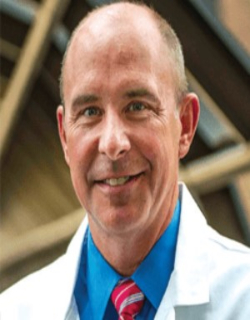
Douglas P Slakey
University of Illinois Chicago, USA
Dr. Douglas Slakey is an internationally recognized transplant surgeon and healthcare professional and administrator with 30 years of comprehensive success and rapid career growth in Clinical and Business Leadership. He is enthusiastic about driving change, constantly searching for ways to improve processes, and leading teams to optimize patient treatment. Doug strives for the best outcome and has led strategically major transformation initiatives that have propelled organizations to peak patient care and high reliability while ensuring that the return on investment and bottom-line impact are on target. He is highly committed to a philosophy of “patient-centric” medical care. He is enthusiastic about discovering methods of collaborative healthcare ecosystems whereby patient data and analysis enable various functions to communicate and conduct proactive treatment and care. Doug has utilized his training and position as a respected surgeon to introduce novel management ideas, leading to highly successful treatment practices. Doug is currently the President of DPSURGICAL, LLC, a healthcare consultancy focused on enhancing and optimizing operations and process flow, emphasizing complex system management strategies. His work incorporates advanced analytics to individualize patient care and effectively align resources with patient needs during their personal healthcare journey. Doug designs education and simulation training to empower “teams of teams” that create value and top-of-license performance at the point-of-care delivery. During his 5 years at Advocate Aurora Health, Doug served as Chief of Surgical Services, providing direction and strategic guidance in defining a vision for surgical services across 27 hospitals and articulating the potential for growth in patient services and clinical training. In addition to his clinical responsibilities, He focused on identifying and eliminating inefficiencies and incorporating ways to better adopt technology (e.g., advanced data analytics, artificial intelligence, and machine learning) to become more patient-centric and efficient, incorporating “design-thinking” principles to optimize the patient experience. As part of his ambitious growth plan, Doug launched a unique program closely aligned with what medical professionals and patients indicated they needed. Doug procured funding sources to work with external stakeholders, such as innovative technology providers. He also developed and implemented a new surgery residency program, leveraging critical learnings from similar programs built in other locations, incorporating education, simulation, and research. Before this, Doug spent 21 years of his career at Tulane University, cumulating in his role as Professor and Chair of Surgery. To build the most effective organizational support structure, he adopted a multi-disciplinary approach to create “teams of teams”, including medical and administrative disciplines. He established collaborative relationships internally and externally to improve healthcare throughout the Gulf South, including reducing disparities in access to care. He built a team of highly reliable experts, including leaders from other industries, such as aviation, and led innovative efforts to demonstrate improvements in healthcare value globally. After Hurricane Katrina, Doug led efforts to rebuild healthcare across the region. Amidst fragmented structures and processes, he was able to secure funding and support (on average, $2M/year) through donors and other stakeholders. Doug is a strategic, astute, and empathetic leader with a solid commitment to inspiring connection and delivering value. He is an enthusiastic executive proponent of employee mentoring and training to instill company culture, translate values into action, and apply best practices for effective change management. He is focused on empowering others to succeed and providing education and training to enhance effectiveness, efficiency, and collaboration. Doug sits on the editorial boards of major medical journals, has nearly 40 referenced abstracts, and has authored more than 150 peer-reviewed articles. He received his Bachelor of Arts and Master of Public Health degrees at UC Berkeley and his Medical Degree at the Medical College of Wisconsin. Residency and fellowship training was at Medical College of Wisconsin, University of Oxford, and Johns Hopkins.


